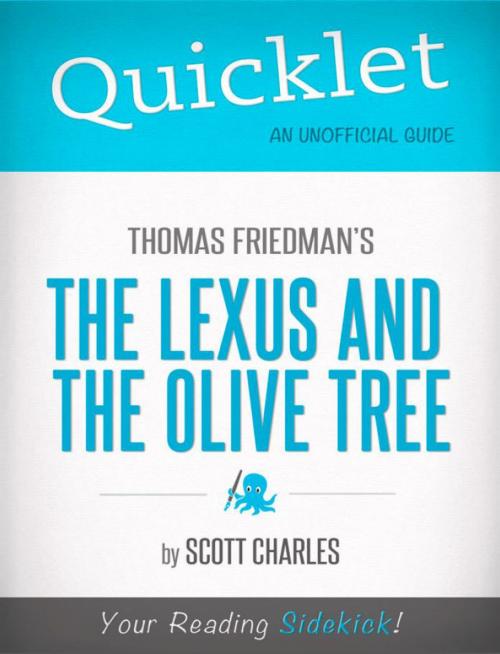Quicklet On Thomas Friedman's The Lexus and the Olive Tree
Nonfiction, Reference & Language, Study Aids, Book Notes, Art & Architecture, General Art| Author: | Scott Charles | ISBN: | 9781484006962 |
| Publisher: | Hyperink | Publication: | February 8, 2012 |
| Imprint: | Hyperink | Language: | English |
| Author: | Scott Charles |
| ISBN: | 9781484006962 |
| Publisher: | Hyperink |
| Publication: | February 8, 2012 |
| Imprint: | Hyperink |
| Language: | English |
ABOUT THE BOOK
Someone I worked for once said to me, “there is a difference between your sphere of influence and your sphere of concern.”
That’s the challenge of Thomas Friedman’s “The Lexus and the Olive Tree: Understanding Globalization” ‒ to grasp the awesome power of globalization while still living decidedly local lives. At least most of us do. I do. Or at least I did.
Mr. Friedman has a huge wealth of stories to tell. His ability to weave together a stream of anecdotes into circumstantial evidence is impressive. Without using charts, or graphs, or abstract economic concepts, he makes a convincing case that “Globalization” is real.
It’s here to stay and we better get used to it.
I agree. We better get used to it. In a relatively short time the world has gone from telegraph to telephone to Internet. Combine that with sophisticated supply chains that deliver goods in a matter of hours instead of weeks or months, and you have today’s market place.
MEET THE AUTHOR
Scott Charles has over a decade’s worth of experience as a research analyst. Scott spent 11 years at a Fortune 500 company providing research and analytical services to marketing teams, product managers, R&D staff, and executives. His specialty is doing comprehensive deep dives to support ideation processes, identifying business opportunities, market analysis and business development.
EXCERPT FROM THE BOOK
Thomas Friedman’s object in The Lexus and the Olive Tree: Understanding Globalization is to provide a framework for understanding “globalization” as an international system. Globalization, according to Friedman, is the sum total of all the various economic interests of everybody in the world. These interests are not bound by national borders, or by any particular cultural barrier. The simple clarity of the Cold War (e.g., US vs. Soviet Union) has been replaced by something more complex.
Everybody is pro-globalization to the extent they benefit, and against globalization to the extent it damages their interests. The conflict therefore is about power: who has it, who wants it, and how much is it worth. Sometimes power in measured in money, sometimes in political or cultural control.
Friedman knows all this, and his narrative has a few well placed caveats.
The problem is in sorting out all the various dynamics. Friedman doesn’t actually set out to sort everything out, he attempts to define what is going on in the broadest sense.
Simply put, globalization can be understood as the combination of advanced communications technology and supply chain management. The ideas here are nothing new: the telegraph and the Erie Canal had the same impact. A few years later, the telephone and the Panama Canal had an even bigger impact.
What’s new this time around is the enormous interconnectedness of it all. The human dynamic tensions have not changed, but the speed at which the interactions happen, and the scope, is way larger. And in this new world, individuals have more power.
Because the Internet changes everything.
Buy a copy to keep reading!
ABOUT THE BOOK
Someone I worked for once said to me, “there is a difference between your sphere of influence and your sphere of concern.”
That’s the challenge of Thomas Friedman’s “The Lexus and the Olive Tree: Understanding Globalization” ‒ to grasp the awesome power of globalization while still living decidedly local lives. At least most of us do. I do. Or at least I did.
Mr. Friedman has a huge wealth of stories to tell. His ability to weave together a stream of anecdotes into circumstantial evidence is impressive. Without using charts, or graphs, or abstract economic concepts, he makes a convincing case that “Globalization” is real.
It’s here to stay and we better get used to it.
I agree. We better get used to it. In a relatively short time the world has gone from telegraph to telephone to Internet. Combine that with sophisticated supply chains that deliver goods in a matter of hours instead of weeks or months, and you have today’s market place.
MEET THE AUTHOR
Scott Charles has over a decade’s worth of experience as a research analyst. Scott spent 11 years at a Fortune 500 company providing research and analytical services to marketing teams, product managers, R&D staff, and executives. His specialty is doing comprehensive deep dives to support ideation processes, identifying business opportunities, market analysis and business development.
EXCERPT FROM THE BOOK
Thomas Friedman’s object in The Lexus and the Olive Tree: Understanding Globalization is to provide a framework for understanding “globalization” as an international system. Globalization, according to Friedman, is the sum total of all the various economic interests of everybody in the world. These interests are not bound by national borders, or by any particular cultural barrier. The simple clarity of the Cold War (e.g., US vs. Soviet Union) has been replaced by something more complex.
Everybody is pro-globalization to the extent they benefit, and against globalization to the extent it damages their interests. The conflict therefore is about power: who has it, who wants it, and how much is it worth. Sometimes power in measured in money, sometimes in political or cultural control.
Friedman knows all this, and his narrative has a few well placed caveats.
The problem is in sorting out all the various dynamics. Friedman doesn’t actually set out to sort everything out, he attempts to define what is going on in the broadest sense.
Simply put, globalization can be understood as the combination of advanced communications technology and supply chain management. The ideas here are nothing new: the telegraph and the Erie Canal had the same impact. A few years later, the telephone and the Panama Canal had an even bigger impact.
What’s new this time around is the enormous interconnectedness of it all. The human dynamic tensions have not changed, but the speed at which the interactions happen, and the scope, is way larger. And in this new world, individuals have more power.
Because the Internet changes everything.
Buy a copy to keep reading!















